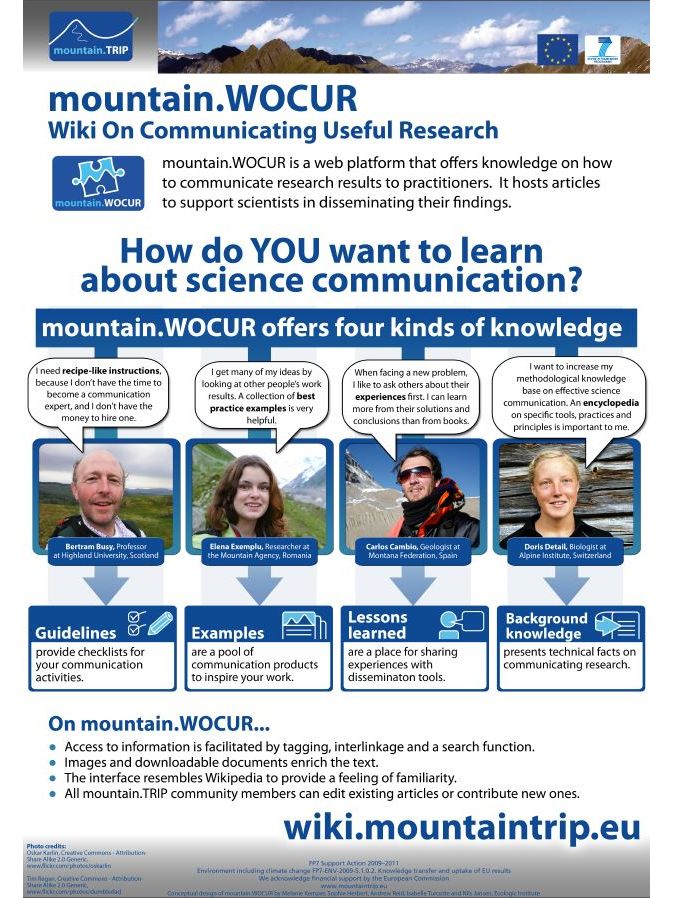Mountain Sustainability: Transforming Research into Practice (mountain.TRIP)
- Project
- Research Program
- Duration
-
-
Global change holds many risks for European mountain regions. Melting glaciers, changes in permafrost and vegetation, as well as political, economic and cultural globalisation present dangers for mountain populations. Numerous research projects have produced valuable findings to ensure sustainable development in European mountain regions. Mountain.TRIP starts where these projects stop: translating research findings into useful information for practitioners.
Background of the project
The European Union initiated and funded numerous research projects on change and adaptation strategies for mountain regions. These projects produced valuable findings. However, this knowledge is often not adequately communicated to end-users, and research results are not accessible to practitioners in terms of content, language or format.
Objectives of the project
Mountain.TRIP breathes new life into these research findings by translating research results into information useful for practical applications. Through the project, knowledge is made available to interested stakeholders in a user-friendly form. Mountain.TRIP makes use of the full potential of web-based information and communication technology, and therefore contributes to improving the impact of research on sustainable development in mountain areas.
Tasks of the Ecologic Institute
Within mountain.TRIP, the Ecologic Institute is responsible for the first round of interaction between science and practice. Therefore, the Ecologic Institute organized a workshop for European mountain practitioners and their representative organisations in Brussels on 9 November 2010. A background paper [pdf, 1.3 MB, English] was prepared by the Ecologic Institute for this workshop containing four information strategies targeted at particular groups of mountain practitioners in Europe. The paper presents sets of information products. The purpose of the information products is to further disseminate research results that are meaningful to specific groups of practitioners and to sustainable development of mountain areas in the EU in general. Practitioners’ feedback during the workshop took the form of testing and validating the developed communication options, checking their suitability, identifying strengths and weaknesses and creating new ideas on how strategies and products can be improved. Sophie Herbert presented a summary of mountain.TRIP results regarding the fit between research results and practitioners‘ information needs at the workshop. Her presentation is available for download [pdf, 422 KB, English].
In the last phase of mountain.TRIP Ecologic Institute produced an animated video entitled "Co-ops in the Clouds: Marketing Mountain Foods". It uses a lighthearted, and humorous style to visualize selected contents of guidelines for producers of mountain products. It was produced in Englisch, German, Romanian, Spanish, Polish, French, Italian and Bulgarian.
Furthermore the Ecologic Institute was responsible for the design and implementation of the collaborative webplatform mountain.WOCUR – Wiki On Communicating Useful Research. Mountain.WOCUR offers knowledge on how to communicate research results to practitioners. It aims to support scientists in disseminating their valuable findings through guidelines, examples, lessons learned and background knowledge.
At the final conference of mountain.TRIP R. Andreas Kraemer, Director of Ecologic Institute, highlighted the possibilities and challenges that social media presents for science communication. In his keynote speech "Dialogue or Dead End? Social media for science communication" he noted that communication between researchers and practitioners can occur in a relatively egalitarian and non-hierarchical manner. As such, the characteristics of social media make it well suited to facilitating new means of communication.
The project mountain.TRIP is funded under the Seventh Framework Programme for Research and Technological Development (FP7) of the European Union.




